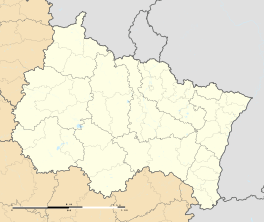Commercy
| Commercy | ||
|---|---|---|
|
The castle | ||
| ||
 Commercy | ||
|
Location within Grand Est region  Commercy | ||
| Coordinates: 48°45′43″N 5°35′33″E / 48.7619°N 5.5926°ECoordinates: 48°45′43″N 5°35′33″E / 48.7619°N 5.5926°E | ||
| Country | France | |
| Region | Grand Est | |
| Department | Meuse | |
| Arrondissement | Commercy | |
| Canton | Commercy | |
| Intercommunality | Pays de Commercy | |
| Government | ||
| • Mayor | François Dosé | |
| Area1 | 35.37 km2 (13.66 sq mi) | |
| Population (1999)2 | 6,324 | |
| • Density | 180/km2 (460/sq mi) | |
| Time zone | CET (UTC+1) | |
| • Summer (DST) | CEST (UTC+2) | |
| INSEE/Postal code | 55122 / 55200 | |
| Elevation |
227–280 m (745–919 ft) (avg. 232 m or 761 ft) | |
|
1 French Land Register data, which excludes lakes, ponds, glaciers > 1 km² (0.386 sq mi or 247 acres) and river estuaries. 2 Population without double counting: residents of multiple communes (e.g., students and military personnel) only counted once. | ||
Commercy (French pronunciation: [kɔ.mɛʁ.si]) is a commune in the Meuse department in Grand Est in north-eastern France. The 18th-century Lorraine historian Nicolas Luton Durival (1713–1795) was born in Commercy.
Commercy is the home of the Madeleines referred to by Marcel Proust in A la Recherche du Temps Perdu.[1]
In Fiction
Commercy is the key location for action in the 1964 Film 'The Train' although this did not use the town for filming purposes.
Twin towns
It is twinned with the German town of Hockenheim.
See also
References
- ↑ Proust, Marcel (1922). Du côté de chez Swann. À la recherche du temps perdu. Grasset and Gallimard.
External links
| Wikimedia Commons has media related to Commercy. |
- Office de Tourisme du Pays de Commercy (France)
- Office de Tourisme du Pays de Commercy (European Union)
This article is issued from Wikipedia - version of the 11/6/2016. The text is available under the Creative Commons Attribution/Share Alike but additional terms may apply for the media files.

